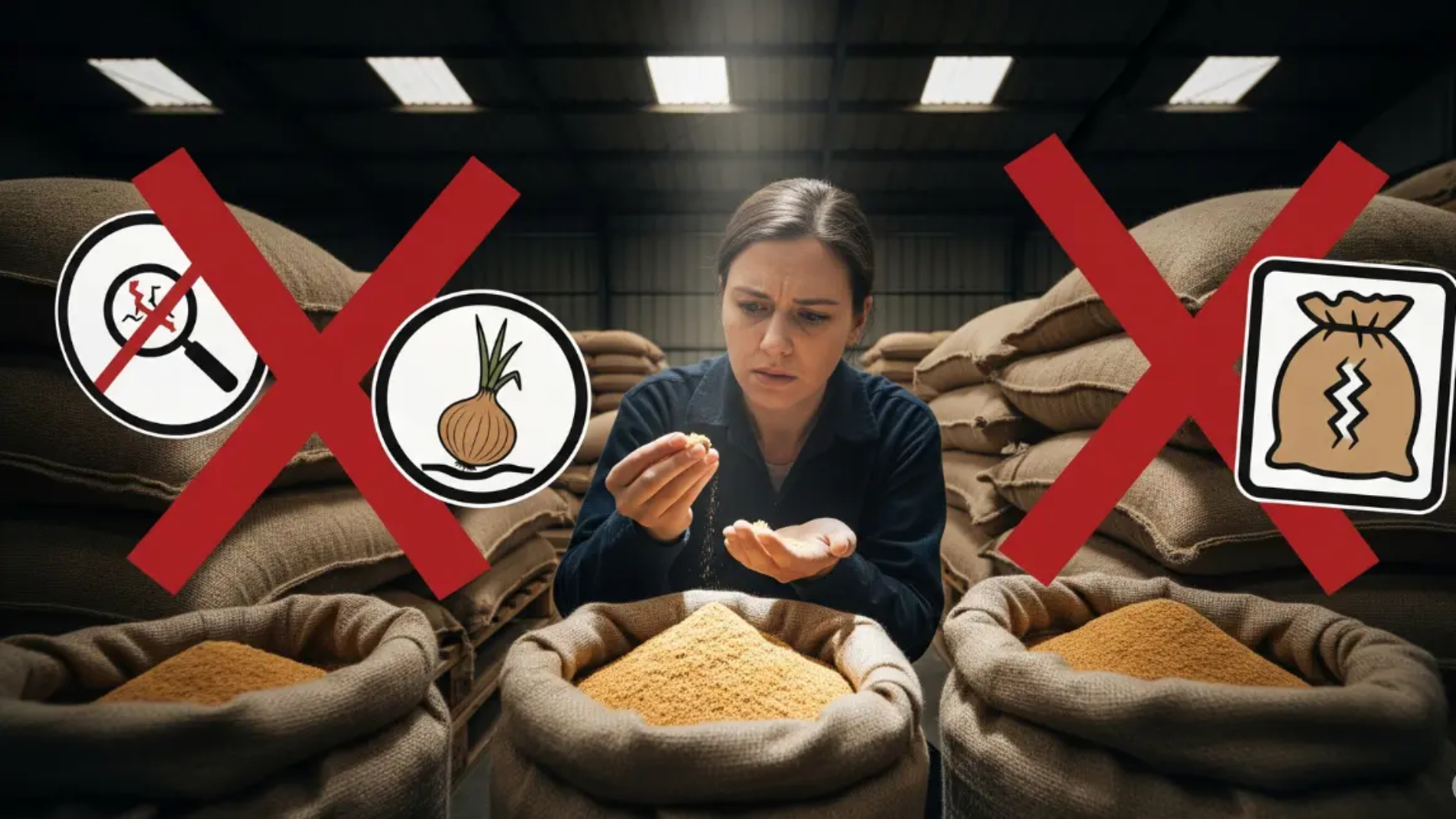Quality onion powder you need to know:
Onion powder is a cornerstone ingredient in the global food industry. From savoury snacks and spice blends to soups, sauces, and marinades, its concentrated flavour provides a convenient and consistent base. For food manufacturers and distributors, buying bulk onion powder is a routine part of operations. However, this seemingly simple purchase is fraught with potential pitfalls that can impact your product quality, budget, and brand reputation.
Focusing solely on the upfront cost can lead to significant downstream problems. To ensure you source consistent, quality onion powder every time, it’s crucial to avoid these five critical mistakes.
Mistake 1: Focusing Only on Price and Ignoring the Specification Sheet
The most common error buyers make is choosing a supplier based on the lowest onion powder price alone. While budget is important, the technical specifications are what determine if the powder is suitable for your application. Ignoring the spec sheet is a recipe for disaster.
The Impact: You might receive a product that is too coarse for your soup mix, has a brownish colour that ruins the look of your white sauce, or lacks the pungent flavour your customers expect.
How to Avoid It: Always demand and carefully review the product specification sheet before purchase. Pay close attention to:
Mesh Size: This indicates the particle size or granulation. A fine powder (e.g., 100-120 mesh) is different from a granulated one (e.g., 40-60 mesh).
Colour: Is it creamy white, off-white, or toasted? Ensure it matches your product’s requirements.
Moisture Content: This is vital for shelf life. High moisture (above 6-7%) leads to caking and spoilage.
Purity: The spec sheet should confirm it is 100% dehydrated onion with no fillers or undeclared anti-caking agents.
Mistake 2: Failing to Vet the Supplier's Reputation and Origin
In the global market, not all suppliers are created equal. Assuming any quality onion powder supplier can provide consistent quality is a risky gamble. The country of origin also plays a significant role in the flavour profile of the final product.
The Impact: You could face inconsistent batches, unreliable delivery schedules, or even receive an adulterated product from a dubious supplier.
How to Avoid It: Do your due diligence. Research your potential supplier. Look for a professional website, client testimonials, and industry experience. Ask about the origin of their onions. For example, quality indian onion powder is often sought after for its characteristic pungency, derived from the specific onion varieties grown in the region. A reputable supplier is a partner who invests in quality control.
Mistake 3: Skipping the Pre-Purchase Sample Evaluation
Placing a large bulk order without first testing a sample is like buying a car without a test drive. Product photos and descriptions can be misleading. A physical sample is the only true way to gauge quality.
The Impact: The bulk shipment arrives and is nothing like you expected in terms of taste, aroma, or texture. You are now stuck with unusable inventory and a significant financial loss.
How to Avoid It: Always request a pre-shipment sample. When it arrives, evaluate it rigorously:
Visual Check: Does the colour match the specs? Is it uniform?
Aroma Test: Does it have a strong, clean onion aroma?
Taste Test: Does it deliver the expected pungent and savoury flavour?
Texture Test: Is it free-flowing, or are there hard clumps indicating moisture problems?
Mistake 4: Disregarding Food Safety Certifications
In the food industry, safety is non-negotiable. Assuming a supplier follows best practices without asking for proof is a major liability.
The Impact: You could unknowingly introduce contaminated ingredients into your production line, leading to product recalls, legal action, and irreparable damage to your brand. For importers, a lack of proper documentation can mean the shipment is rejected at the port.
How to Avoid It: Insist on seeing food safety certifications. A professional quality onion powder supplier will readily provide documentation like ISO 22000, HACCP, or FSSC 22000. Furthermore, ask for a Certificate of Analysis (COA) for each batch to verify it is free from harmful microbiological contaminants and meets all safety standards.
Spice Up Your Business with Authentic Indian Flavors
Import and Export Excellence from India!

Mistake 5: Overlooking Packaging and Logistics Details
The quality of onion powder is heavily influenced by how it’s handled after production. Improper packaging and poor logistics can ruin a perfect product before it ever reaches your facility.
The Impact: Your shipment arrives with caked, unusable powder due to moisture exposure, or you face unexpected delays and costs due to customs issues.
How to Avoid It: Discuss packaging in detail. The industry standard for bulk onion powder is multi-wall paper bags with a sealed inner food-grade poly-liner to act as a moisture barrier. Clarify shipping terms (Incoterms), estimated lead times, and ensure the supplier can provide all necessary documentation for smooth customs clearance in your country.
By avoiding these five mistakes, you transform the procurement process from a gamble into a strategic business decision. Investing time in due diligence ensures you secure a high-quality ingredient that enhances your products and protects your bottom line.
Frequently Asked Questions (FAQs)
1. Why does onion powder clump or cake, and how can it be prevented? Quality Onion powder is hygroscopic, meaning it readily absorbs moisture from the air. Caking is caused by high moisture content. Sourcing powder with a low moisture level (under 7%) and ensuring it is packed in moisture-proof bags is the best prevention.
2. What is the difference between white onion powder and toasted onion powder? White quality onion powder is made from dehydrated white onions and has a sharp, pungent flavour. Toasted onion powder has been heated, giving it a deeper, sweeter, and more roasted flavour profile with a darker colour. The right choice depends on the desired flavour in the final product.
3. What does the “mesh size” of quality onion powder mean? Mesh size refers to the particle size, indicating how fine or coarse the powder is. A higher mesh number (e.g., 120 mesh) means a finer powder, while a lower number (e.g., 40 mesh) indicates a coarser, more granulated texture.
4. Is Indian quality Onion Powder known for good quality? Yes, India is a major producer and exporter of dehydrated onion products. indian onion powder is often valued for its strong pungency and flavour, which comes from the specific varieties of onions grown in the country.
5. What is a Certificate of Analysis (COA) and why do I need it? A COA is a lab report that verifies the product meets all its specifications. For onion powder, it will confirm details like moisture content, microbiological safety (e.g., E. coli, Salmonella), and purity, giving you documented proof of quality.
6. Are anti-caking agents always bad in quality onion powder? Not necessarily. Food-grade anti-caking agents like silicon dioxide are often added in very small amounts (~1-2%) to ensure the powder remains free-flowing. A quality supplier will always declare its use on the specification sheet. The key is transparency.
7. How much does a lower-quality onion powder really affect the final product? The effect is significant. A lower-quality powder can result in a weak or “off” flavour, poor texture, unwanted colour changes, and a shorter shelf life for your finished product, ultimately disappointing your customers.
8. What are some common onion powder uses in the food industry? It’s incredibly versatile. Common onion powder include seasoning for snacks (chips, crackers), a flavour base for soups and stews, an ingredient in sauces and dressings, and a key component in dry rubs and marinades for meat and poultry.



Leave A Comment